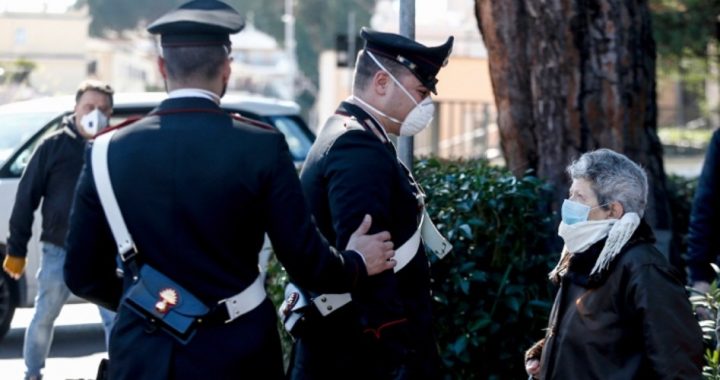
Is it possible to stop the spread of SARS-CoV2 by erecting a police state? We are to believe that this worked in China, though truth is a flexible construct at best in communist nations. But now, Italy is implementing measures that would have made Il Duce blush. Instead of making the trains run on time, today’s pandemic-afflicted Italy is ensuring that no one can do anything, on time or otherwise.
The Local, an English-language Italian news site, has published an overview of Italian quarantine rules. They amount to a precise recipe for “Instant Police State.”
The first question an Italian citizen might have which The Local answers is: “Can I leave my house?”
One would think the answer is “yes.” And, in Italy, the answer is “yes,” but only if citizens fill out the required paperwork. According to The Local, the government has asked people to stay indoors unless they have “an urgent need to go out, such as for work or a medical appointment, or to buy food.” Of course, citizens will have to “fill out a form when leaving the house declaring your reasons for doing so.”
But, if you do go outside, don’t go too far. “If you’re traveling outside your local area, you may be stopped and asked by police to state your reasons for travel,” The Local reports.
So, the site asks, “are people allowed to travel at all?” Sure, but only in cases of “urgent, proven work-related” situations, for health reasons, for certain “situations of need,” or to go home. Anyone caught breaking these rules faces criminal charges, fines, or even time behind bars (up to three months!).
Take heart, though — “Police are not on every corner, and not everyone will have their paperwork checked.”
Is this really necessary? The example of South Korea provides a counterpoint to the situation in Italy.
Outside of China, Italy and South Korea have been among the hardest hit, to date, by the coronavirus. But while cases are still ramping up at a high rate in Italy, what appeared at first to be a situation that was at least as bad in South Korea seems to be faring much better. Why?
This is the question posed by Peter C. Earle, an economist writing for the American Enterprise Institute. “How is it,” Earle writes, “that without deploying the military or imposing widespread, enforced quarantine, the spread of coronavirus in South Korea is apparently slowing?”
According to Earle, the answer is that South Korea is respecting private property rights and benefiting from the self-interest of property owners.
“South Korea is leveraging private property rights to thwart the spread of the virus, with building owners posting and enforcing ‘no mask, no entry’ signs. (Just imagine how many Americans would react to being turned away or denied service from a favored destination at the sole discretion of the proprietor.),” Earle writes.
Further, Earle notes, in South Korea, “Drive-through testing stations have been set up nationwide through which individuals, after a 10-minute test, are notified within a few hours if infected. A voluntary, self-diagnosis phone app was created in the early stages of the pandemic, and ‘living and treatment’ centers set up in a ‘soft quarantine’ spirit.”
How well has this worked, so far, in South Korea? According to Statista, the outbreak began in the nation in mid-February and peaked at the end of the month and the first days of March. Since then, the country has experienced a consistent decrease in new infections.
Meanwhile, in the new Italian police state, the opposite has occurred. There, the outbreak started at around the same time, but has exploded with no let up since.
Of course, there may be other factors besides respect for freedom and property rights at play in the experience of these two nations. But, arguably, South Korea should have fared at least as bad as Italy. After all, South Korea is one of the world’s most densely populated nations, with a far more concentrated population than Italy. (532 people per square mile in Italy; 1,366 people per square mile in South Korea). It seems like the spread of the virus should have been even faster in South Korea based on population density alone.
The knee-jerk reaction to the coronavirus pandemic is to call for all manner of statist restrictions on people. As Italy is demonstrating, this may not be the best strategy for dealing with the health crisis.
These troubled times seem to require two strategies. One that protects people’s lives, and another that protects and respects peoples freedoms and dignities. Though it may seem so, these are not mutually exclusive.
It is still early in the pandemic and the situation remains fluid. But it bears repeating that in the face of this or any other crisis, we should be eager to lose neither our lives nor our liberties.
Photo of Italian paramilitary police officers during a random check in Rome: AP Images
Your Papers Please: Statists Call for Domestic Travel Restrictions in USA
Your Papers Please: State Forces Kentucky Man Into Home Quarantine



